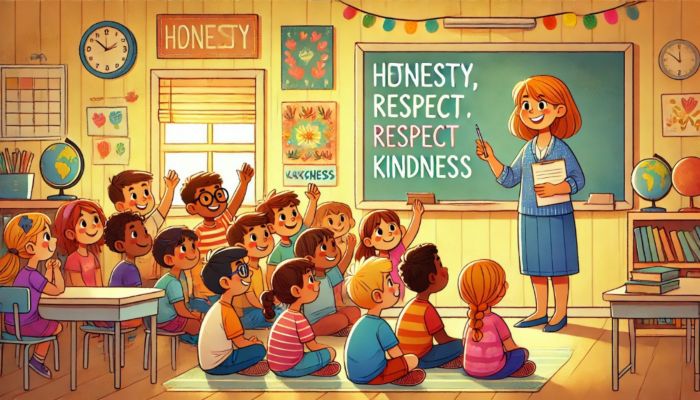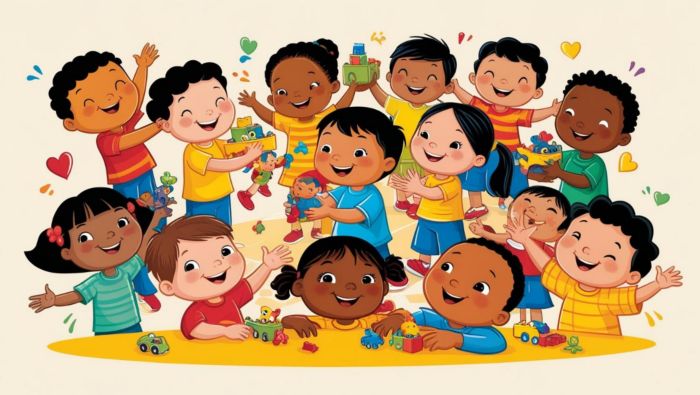The Importance of Moral Values for Kids: A Guide for Parents and Teachers
By orchidadmin |
Date 08-08-2024

Table of Contents
- Importance of moral value
- Understanding Moral Values:
- Essential Moral Values Every Child Should Learn:
- How to Encourage Kindness and Empathy:
- Compassion and Generosity:
- Forgiveness and Understanding:
- Teaching Moral Values to Children: How to do it
- Why Do We Need to be Consistent in Moral Education?
- Fundraising & Charity Work: Learning to donate for social causes
- Ministries of Education and High Education:
- Role of the Teacher in Shaping Character:
- Building School Policies Based On Moral Values:
- Difficulties in Teaching Morality in Today’s World:
- The role of technology and social media:
- Peer Pressure and Its Effects:
- Other Related Section
Admissions Open for
Moral values are an important aspect for children who are growing up in the environment of peers and friends, that behind their decision making and among them when they're grown so moral values are the importance of character for children parents should teach their children moral values. Through their values, trust, dishonesty, empathy, respect, responsibility, and teaching children parents and adults enjoy every facet of their lives are preparing children with the tools they will need to face the world's challenges with integrity and compassion.
Importance of moral value
Principal Emphasizes the Significance of Moral Values in the Classroom
Understanding Moral Values:
Moral values form the basis of a complete personality and they help to strengthen a person. They provide guidance as to how to act, they help young people ensure they understand right from wrong and help maintain healthy relationships in society.

What Are Moral Values?
-
Moral values are the principles that guide us to know what is right and wrong.
-
They are honesty, respect, responsibility, kindness and integrity.
-
Such values instil a Strong Sense of morality within children, allowing them to make the right choice.
Why Are Moral Values Important for Children?
-
Character Building: Assists in building the character of a child which encourages quality personality and moral values.
-
Promotes Social Harmony: It fosters harmonious and cooperative behaviour in society.
-
Improves Decision Making: Helps children to make moral decisions in life Inculcates
-
Empathy and Kindness: Such habits make children compassionate and helpful.
-
Gears them Up for Future Challenges: Lets them have the right attitude for handling adversities.
Essential Moral Values Every Child Should Learn:
Honesty:
Honesty is one of the most fundamental moral values. It teaches children to tell the truth, even in difficult situations. Honesty builds trust and credibility, essential traits for developing strong relationships and a good reputation.
Ways to teach honesty:
-
Encourage children to admit their mistakes.
-
Praise them when they tell the truth.
-
Lead by example by being honest with yourself.
Respect:
Respect is about valuing others and treating them with kindness and consideration. Teaching children to respect people, regardless of differences, fosters harmonious relationships and a positive community environment.
Ways to instil respect:
-
Teach polite language and manners.
-
Encourage active listening and empathy.
-
Show respect to others, including children.
Responsibility:
Being responsible means taking ownership of one's actions and duties. Teaching children responsibility prepares them for real-life challenges and ensures they become dependable individuals.
Ways to encourage responsibility:
-
Assign age-appropriate chores.
-
Encourage accountability for their actions.
-
Teach time management and decision-making skills.
Kindness and Empathy:
Reverse kindness and empathy allow children to better understand and care for the feelings of others. It nurtures good social behaviour and a caring society.
How to Encourage Kindness and Empathy:
-
Make room for acts of kindness, such as assisting a peer.
-
Talk about feelings and how the behaviour impacts others.
-
Explore literature that focuses on empathy and compassion.
Integrity:
Integrity means doing what is right. Top 10 reasons why Indiana Kinsey-Style Integrity should be taught to your children
Ways to teach integrity:
-
Tell them it’s OK to stand up for what is right.
-
Instill the value of consistency between words and actions
-
Related Stories People Who Walk the Talk Share stories about people you know who demonstrate strong integrity.
Perseverance:
Perseverance never giving up despite challenges. It promotes resilience, determination, and hard work.
Ways to develop perseverance:
-
Advocate for goal setting and effort.
-
Put the words you use to praise successes behind them, praise effort instead.
-
Share the stories of those who have persevered and succeeded.
Gratitude:
Teaching kids to be grateful teaches them to appreciate what they have and acknowledge others’ work. It encourages happiness and gratitude.
Ways to practice gratitude:
-
Encouraging daily gratitude reflections.
-
Reinforce the concept of saying “thank you” to children.
-
Be an example and show appreciation for ourselves.
Fairness:
Fairness means treating others as you want to be treated. It instils a sense of justice and moral behaviour.
Ways to instil fairness:
-
Teach children to take turns and share.
-
Explain that rules can help create an environment where everyone is safe and respected. Train them to follow rules.
-
Let them explore discussions around how people should be treated in various scenarios.
Compassion and Generosity:
Kindness and benevolence are integral traits that contribute to a child’s emotional and social maturity. Kids can relate to the struggles of others and support them through it with compassion. Generosity, though, teaches children to give their time, their resources, and their kindness freely, without expectation of reward. Teaching kids to give back compassionate kids are great community members as well as strong friends.
How to Teach Kids Compassion and Generosity:
-
Promote acts of kindness, like helping a friend, comforting a sad person, or sharing with others.
-
Love to give, and take them in charity because they did not make any difference between the clothes, food, or toys.
-
Read stories or watch movies that emphasize the value of kindness and sharing.
-
Lead by example and demonstrate kindness and generosity in everyday life.
Self-Discipline and Patience:
Self-discipline enables children to manage their urges, keep sight of their objectives, and make sensible decisions. Patience, another vital quality, helps them keep their cool and stay stubborn in adverse circumstances or at the time of waiting. These values are fundamental skills for success in life and in education, providing children an opportunity to learn resilience and emotional intelligence.
Ways to Develop Patience and Self-Discipline:
-
Creating rules and routines helps the children to build a certain degree of consistency in their behaviour.
-
Teach them to wait for rewards, like saving up for a special toy.
-
Teach patience through activities that require it puzzles, gardening, and taking an interest in a new skill.
-
Acknowledge their ability to practice self-control and maintain their composure in difficult situations.
Forgiveness and Understanding:
Forgiveness and Understanding: Forgiveness is the ability to forgive someone and the ability to then let it go; understanding is how the children realize how others feel and how people view things differently. Forgiving your kids teaches them to forgive which helps them develop emotional resilience and strengthen their social bond. When children learn to identify the feelings of others, they are generally more tolerant and more empathic.

How You Can Encourage Understanding and Forgiveness:
-
Also, help your child express their feelings in ways that promote healthy socialization instead of repression.
-
Help them learn to apologize genuinely and to accept apologies graciously.
-
Help them think of mistakes as teaching moments instead of something to get angry or resentful about.
-
Model forgiveness in your own relationships.
Humility and Modesty:
Humility helps them to recognize their own abilities without being proud, and modesty means to enjoy success without a need for indiscreet attention. These values create gratitude and teach children how to build meaningful relationships.
The Importance of Humility and Modesty:
-
Teach Kids to Own Their Mistakes and Learn From Them
-
Show them that achievements should be celebrated with appreciation, not bragging.
-
Teach them to see and value what everyone else brings to the table.
-
Be humble: Respect everyone, irrespective of status, and be willing to admit when you are wrong.
Courage and Bravery:
Through courage and bravery, kids learn that they have a voice and should stand up for what is right, even, at times, to the detriment of themselves and with risks. Those characteristics help children build the confidence and resilience to, for example, speak out about injustice, experiment and confront fears.
How to Inspire Courage and Bravery:
-
Encourage them to face their fears and try something new.
-
Emphasize the importance of standing up for their beliefs and morals even in challenging circumstances.
-
Encourage them to embrace challenges, like public speaking or a new sport.
-
Discuss real-life heroes who displayed courage in difficult situations.
-
Teaching these moral values to kids can aid their growth into responsible, compassionate, and tough citizens who can be positive contributing members of society.
Teaching Moral Values to Children: How to do it
Develops Good Character and Decision Making Skills: Moral values are the ones that shape a child's character. When the teaching of these values beings at an early age, it secures that kids mold up to be dependable, accommodating, and moral people. These values are an implicit part of teaching given at all levels as far up as university level, but is something we learn through parents, educators, and society alike in our everyday lives.
.jpg)
Parental and Teachers Role Modeling:
We learn best by watching the behavior of adults around us. Their most significant reference points are mom and dad, and their behavior tends to have an indelible influence.
-
Model Behavior: Children mirror their parents, so if they see their parents being truthful, having integrity, or being respectful, they are likely to do the same.
-
Modeling Accountability: Demonstrating to children that it is acceptable to make mistakes, take responsibility for our actions, and often even apologize helps build accountability.
-
Giving Other People Dignity: Interacting with family members, with neighbors, with service providers treating everyone with dignity practices respect for children.
Applying Moral Lessons into Everyday Life:
-
Moral education must not be confined to textbooks; it must be made part of daily life. Instilling values in children requires a practical approach.
-
Teach them to share their toys to offer assistance to a friend in need, or to help elders at home.
-
Practice Gratitude Teach children to be thankful for what they have and acknowledge the contributions of others.
-
Reward Good Behavior Children often carry out ethical behavior under the parents’ positive reinforcement.
-
When kids are able to see the effects of their behavior, they are much more likely to develop moral values and use them in real situations.
A Telling the Story: Using Stories to Show Values:
-
Teaching moral values through stories is a powerful tool stories give abstract concepts a tangible, relatable quality.
-
Employ Classic Fables and Folktales: “The Boy Who Cried Wolf” promotes honesty and “The Tortoise and the Hare” stresses perseverance.
-
Talk About Real Role Models: Children should be told about the good role models in humanity like Mahatma Gandhi (non-violence and peace) and Mother Teresa (compassion) which will help them to see moral values in practice as good role models.
-
Normalize Reflection: When a story comes to a close, ask children what felt new to them and how they might implement that in their day-to-day.
Bringing Up Ethical and Moral Conversations:
-
Discussing ethical dilemmas openly helps kids to develop their own compass concerning moral behavior.
-
Each one of these books also promotes critical thinking: Allow children to weigh in on justice, fairness, kindness, and honesty.
-
Guide Rather Than Judge Rather than tell children what’s right and wrong, help them think critically about situations and make ethical decisions themselves.
Learning Through Play and Things to Do:
How Important is Moral Education for Children?
Here are the Best moral values in Children from playing and activities. Through play, children safely and naturally explore the world, learn how to make choices, and rehearse interactions while learning the more complex ideas of honesty, kindness, teamwork, and respect. They do play real-life scenarios that allow them to explore different perspectives and moral dilemmas in a safe space — when children dress-up as superheroes or play make-believe with their friends.
Teaching Through Play Methods:
-
Role-Playing Games: Kids can take on different roles, as a teacher, doctor, police officer, etc.
-
Storytelling: Moral-based narratives aid children in understanding concepts like honesty and compassion.
-
Board games and puzzles: They are helpful in improving decision-making skills and teaching fair play.
-
Creative Arts: Art, music, and drama are also powerful ways for children to express their emotions and learn about ethical situations.
-
Organized Outdoor and Team Activities: Foster cooperation, patience, and team problem-solving skills
Establishing clear rules and expectations:
Kids do better in settings where expectations and rules are spelled out. Boundaries will clarify for them what behaviors are acceptable and what behavior is not. The adults in the lives of young adults — parents, teachers, everyone — need to set the rules and reinforce the rules consistently.
How to Set Rules and Expectations:
-
Be Clear: Use plain language to explain the rules and why they matter.
-
Have a Zero Tolerance Policy: Establish a zero-tolerance policy and stand by it.
-
Explain the Reasoning: Do not just enforce rules; explain why they are needed.
-
Sharing a List of Rules and Expectations: It includes rules that the children helped create so they feel more accountable.
-
Use Positive Reinforcement: Emphasise following the rules over punishing if the rules aren’t followed.
Must Have Real Life Experiences and Face to Face Interactions:
Of course, children learn through real-life experiences and social interactions. Being exposed to varied circumstances and people will nurture empathy, tolerance, and deeper insights into morality. Experiences in the real world allow for children to see ethical behavior in action and practice it themselves.
Ways to Give Real-Life Experiences:
-
Outreach: Get involved in volunteer programs and charitable events.
-
Engagement Content: Discuss the daily experiences and life lessons.
-
Modeling Behavior: Children will follow what adults do, so parents and teachers should model correct ethical behavior.
-
Teach: Them the poor decision of doing something wrong.
Positive Reinforcement and Gentle Correction:
Reinforcement of the positive is a strong tool in the moral education. Praising positive behavior is a motivating force to encourage children to repeat it, while calmly correcting bad behavior allows kids to learn from mistakes without fear or resentment.
Enhancing Positive Behavior Through Effective Rewarding:
-
Recognizing good behavior verbally: Mention good behavior.
-
Physical Rewards: Stickers or additional playtime may inspire kids.
-
Encouragement Notes Writing positive notes for children boosts their confidence
-
Celebrating Nuggets: Acknowledging efforts in moral growth promotes continuity.
Correcting Mistakes Gently:
-
Explain Instead of Scold: Instead of saying with increased volume. That was the wrong thing to do in one simply explains why the act was wrong.
-
Engage in Reflection: Discussion with children on how they might have behaved differently.
-
Table Other Options: Break other ways to address equal situations in the future.
-
Be Patient and Kind: Instead of being mad and disappointed, lead with kindness.
Why Do We Need to be Consistent in Moral Education?
This consistency proves to be paramount in moral education. Children are developing a moral compass that needs practice, lessons learned time and again. Confusion may arise due to mixed messages or lack of consistency in reinforcement, hindering the ability of children to differentiate right from wrong.
Keep a Consistent Message in educating morals:
-
Moral Capital: The tea ching from parents, teachers and care givers should be congruent.
-
Discourse and Rehearsal: Discussing and rehearsing moral values makes them more salient.
-
Enforce with Consequences: When a rule is violated, follow through consistently with appropriate consequences.
-
Promote Internal Values: Guide children to understand values themselves rather than acting under threat of punishment.
Model the behavior you want from kids:
When a child has the opportunity to see that process unfold, that is moral education and it is a lifelong process that takes time, attention, and devotion. It takes play, rules, experiences, reward, and consistency to raise responsible citizens that find their place in society.

Schools and Their Role in the Development of Moral Values:
This is because schools are important character builders for children. They offer an environment in which students can engage with peers, teachers, and the perspectives of others, learning as well as practicing moral values.
Value Education Curriculum:
A formal value-based education syllabus through curriculum makes sure that ethics is taught to students at school.
-
Integrate Moral Lessons in Curriculum: Schools can explore subjects such as literature, history, and social studies intertwined with ideas including honesty, respect, and kindness.
-
Conduct Workshops and Seminars: Organizing guest lectures or workshops on ethics & values can provide a deeper understanding for the students.
-
Introduce Scenarios: Schools must help students resolve scenarios in which they need to consider the ethics behind their choices.
Promoting a Positive School Environment:
-
Deepening a Child’s Moral Growth: One of a school’s strongest influencers is its culture.
-
Initiate Anti-Bullying Programs: Having a conversation around bullying goes a long way in including kindness within the kids and helping them develop empathy.
-
Encourage Teamwork and Fairness: Team activities and sports instill values like cooperation, honesty, and fairness.
-
Fostering Kindness: Schools can plan trips to orphanages, homes for the elderly, animal shelters, etc to sensitize the students.
-
Note: The best kind of burning event can be tree-planting drives or cleanliness campaigns to develop the sense of responsibility towards the community.
Fundraising & Charity Work: Learning to donate for social causes
Creating Confusion and Collaboration:
Teamwork And Collaboration: teaches children respect, patience, and understanding towards others. Schools encourage these types of skills through group activities and discussion projects in the different classes that need this type of cooperation.
Group Activities: In schools, teachers can design group work or collaborative learning activities that require students to work together and divide roles.
Sports and Games: Introducing children to games like badminton or even asking them to join the community football or cricket is a great way of teaching them the values of leadership and team work.One great thing to do is get kids involved in group problem-solving tasks that stimulate and encourage thinking critically and working as a team.
Learning from peer to peer: This occurs when we have a classmate take the role of a teacher to help one student to understand the subject better.Working together allows children to develop important skills such as communication, negotiation and accepting differences that are key to interaction with others in everyday life.
Ministries of Education and High Education:
Extracurricular activities provide the right environment to sensitize children to moral values through natural interaction. These activities allow students to develop empathy, discipline, and responsibility beyond the classroom.
-
Mining Drama and Role-Playing: Schools can use skits and role-playing exercises to teach students about honesty, kindness, and ethical decision-making.
-
Art and Storytelling: You can also conduct storytelling sessions and creative arts with the students to teach moral values, and the students express their right and wrong.
-
Clubs and Societies: In-school debate clubs, environmental clubs and social service organizations can be opportunities for students to practice moral decision-making and ethical leadership.
As they participate in extracurricular activities, they have the opportunity to practice moral values in developmental scenarios, thus strengthening good character in their actions.
Role of the Teacher in Shaping Character:
Character is influenced most by teachers. Educators who are well-trained in morality instill moral values in students well both through direct instruction and by personal example.
-
Workshops: Schools need to provide teachers with workshops to build skills for integrating moral education into the approach of teaching.
-
Action Speak Louder: Teachers need to be honest, kind, and respectful not only to their students but also to each other, students tend to become what they see their teachers do.
-
Setting the Standard for the Culture: A positive and inclusive classroom environment promotes moral behavior among students without having to be forced.
-
Fostering Open Conversations: Teachers need to foster open conversations about moral dilemmas and ethical questions for students to establish their moral compass.
Building School Policies Based On Moral Values:
School policies help regulate behavioral standards for students and reinforce moral education. Establishing clear rules and providing a nurturing environment fosters positive values during early years beliefs and should also take place in childhood.
-
Implement a Code of Conduct: Schools should write down a code of conduct to ensure that school life is rooted in honesty, respect, and responsibility.
-
Positive Reinforcement: The use of reward systems promotes ethical behaviour and responsibility among students.
-
Climate Control: Having anti-bullying policies to follow as well as teaching students how to practice kindness.
-
Engaging parents: In-school activities and discussions about moral education ensure consistency between home and school values.
With policies that promote moral values, schools serve as a safe space, ensuring students feel secure, respected, and inspired to become good citizens.
Difficulties in Teaching Morality in Today’s World:
As parents and teachers, we try our best to teach our children the right values, but with all of modernity’s challenges, it becomes difficult for children to understand good values and embed them in their memory.
The role of technology and social media:
Technology has revolutionized how children learn and communicate, but it also poses ethical dilemmas.
-
Negative Influences Exposure: Social media usually depicts false lifestyles and immoral actions, which can mislead youngsters.
-
Less In-Person Interaction: Too much screen time hinders in-person communication, which is essential for empathy and social skills.
-
Teach digital responsibility: Teach your children about cyber etiquette, online safety and the consequences of their digital footprint.
Peer Pressure and Its Effects:
A child's behaviour is largely influenced by peer pressure.
-
Avoid Peer Pressure: Show kids how to follow their conscience rather than the crowd.
-
Self-Esteem Building: One of the things that helps kids stand up to peer pressure is a solid sense of themselves.
-
We need to maintain open lines of contact with the parents and teachers to make sure these kids get guidance when they come to difficult moral crossroads.
Related blogs:
Effective Ways To Stop Child Labour: Discover crucial strategies to combat child labour now.
Importance of Morning Assemblies in Schools.: Learn how morning assembly can foster discipline in your child.
IB Vs CBSE: Learn whether IB or CBSE is the best board for you.
Other Related Section
NCERT Solutions | Sample Papers | CBSE SYLLABUS| Calculators | Converters | Stories For Kids | Poems for kids | Practice Worksheets | Formulas | Parent Resources
Frequently Asked Questions
Moral values are essential for children to develop good character and behaviour. Here are five key moral values for kids:
-
Honesty – Always telling the truth and being truthful in actions.
-
Respect – Treating others with kindness and consideration.
-
Responsibility – Taking accountability for one’s actions and duties.
-
Kindness – Being compassionate and helpful to others.
-
Fairness – Treating everyone equally and justly.
Moral values guide individuals in making ethical decisions. Here are 10 important moral values:
-
Honesty – Being truthful and transparent.
-
Respect – Valuing others and their opinions.
-
Integrity – Staying true to one’s principles.
-
Compassion – Showing empathy and care for others.
-
Forgiveness – Letting go of grudges and resentment.
-
Responsibility – Being accountable for one’s actions.
-
Courage – Standing up for what is right, even when it’s difficult.
-
Fairness – Treating everyone equally and justly.
-
Gratitude – Being thankful for what one has.
-
Patience – Remaining calm and tolerant in difficult situations.
Seven fundamental moral values that are universally recognized include:
-
Honesty – Being truthful and trustworthy.
-
Respect – Treating others with dignity and kindness.
-
Kindness – Showing compassion and helping others.
-
Responsibility – Taking ownership of one’s actions.
-
Fairness – Ensuring justice and equality.
-
Courage – Facing challenges with bravery.
-
Integrity – Adhering to strong moral principles.
Here are five examples of moral values that guide ethical behaviour:
-
Honesty – Telling the truth and avoiding lies.
-
Respect – Listening to others and valuing their opinions.
-
Compassion – Helping those in need and showing empathy.
-
Responsibility – Completing tasks and owning up to mistakes.
-
Fairness – Sharing and treating everyone equally.
CBSE Schools In Popular Cities
- CBSE Schools in Bangalore
- CBSE Schools in Mumbai
- CBSE Schools in Pune
- CBSE Schools in Hyderabad
- CBSE Schools in Chennai
- CBSE Schools in Gurgaon
- CBSE Schools in Kolkata
- CBSE Schools in Indore
- CBSE Schools in Sonipat
- CBSE Schools in Delhi
- CBSE Schools in Rohtak
- CBSE Schools in Bhopal
- CBSE Schools in Aurangabad
- CBSE Schools in Jabalpur
- CBSE Schools in Jaipur
- CBSE Schools in Jodhpur
- CBSE Schools in Nagpur
- CBSE Schools in Ahmednagar
- CBSE School In Tumkur

Call Us to know more about Orchids
Swipe Up
















